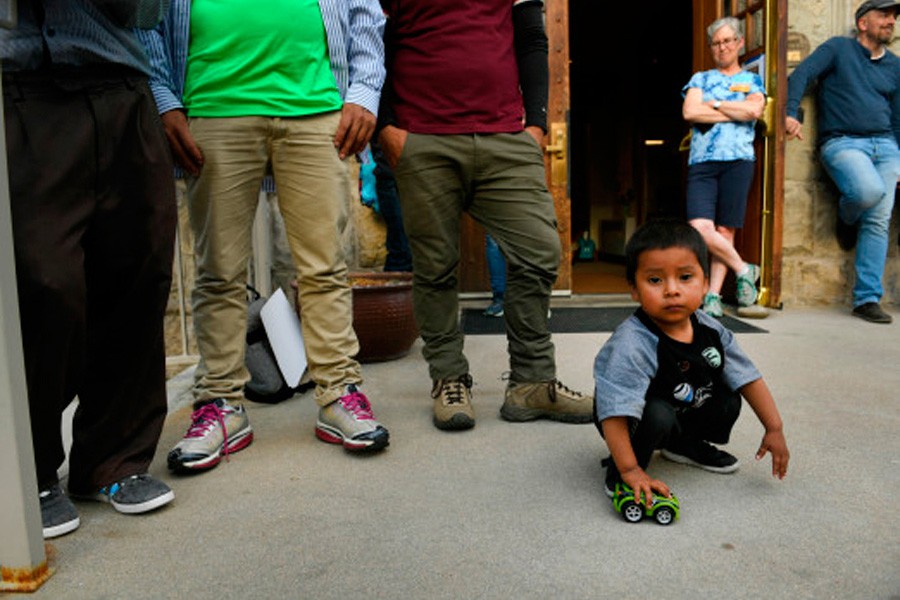The bus carrying dozens of Central Americans from the Texas border arrived in this northern Mexican city late at night and pulled up next to the station, reports AP.
Men and women disembarked with children in their arms or staggering sleepily by their sides, looked around fearfully and wondered what to do.
They had thought they were being taken to a shelter where they could live, look for work and go to school. Instead they found themselves in a bustling metropolis of over four million, dropped off on a street across from sleazy nightclubs and cabarets with signs advertising for "dancers."
The Associated Press witnessed multiple such busloads in recent days carrying at least 450 Hondurans, Guatemalans and Salvadorans from Nuevo Laredo, across from Laredo, Texas, to Monterrey, where they are left to fend for themselves with no support on housing, work or schooling for children, who appear to make up about half the group.
Mexico has received some 20,000 asylum seekers returned to await US immigration court dates under the program colloquially known as "remain in Mexico."
But there had been no sign of such large-scale moving of people away from the border before now, after the program expanded to Nuevo Laredo in violence- and cartel-plagued Tamaulipas, a state where the US State Department warns against all travel due to kidnappings and other crime.
In response to a request for comment, the National Immigration Institute, or INM for its initials in Spanish, said in a two-paragraph statement that the agency cooperates with consular authorities and all levels of government to attend to returnees.
It said Mexico abides by international law and is working to upgrade shelters and immigration facilities "to improve the conditions in which migrants await their processes in national territory." The INM did not address specific questions about the AP's findings.
Maximiliano Reyes, deputy foreign relations secretary, acknowledged last week that migrants were being removed from Nuevo Laredo and said it was for their own safety. He did not explain why they were dropped off in Monterrey or give further details.
"It's clearly important to move people out of very dangerous Mexican border towns," said Maureen Meyer, an immigration expert at the Washington Office on Latin America, which advocates for human rights in the region.
"But simply busing them somewhere else without any guidance on what's awaiting them and without having the services available to house asylum seekers and support them, the Mexican government's really exposing them to further risk."
This account is based on in-person interviews with more than 20 migrants who made the two-hour, 130-mile (220-kilometre) journey south to the industrial city in the week since the new practice began.
Unlike asylum seekers who wait in line for months to file claims in the US and are then sent back, all those taken to Monterrey who spoke with the AP said they had crossed illegally and spent several days in US detention centers before being returned with a court date.
Some said they had not asked for asylum but rather to be returned to their home countries, but were told that going to Mexico or continued detention were the only options.
"I don't know why they gave me this (court date) paper when I didn't ask for it," said Antonio Herrera, a Honduran policeman, explaining that he had asked US immigration to deport him because his 7-year-old daughter was ill.
Javier Ochoa, who was with his 16-year-old son, did try to request asylum because the boy would be in danger back home for his participation in anti-government protests. He said he was not allowed to make his case.
"They didn't interview us," Ochoa said. "Just sign, like it or not."
US authorities, those interviewed agreed, told them Mexico would offer them work, schooling and health care while they waited. The US Department of Homeland Security did not respond to requests for comment.
President Andrés Manuel López Obrador has promised to provide those things, but the reality back in Nuevo Laredo turned out to be different.
The returnees were met at the crossing by waiting Mexican immigration officials who handed them documents presumably allowing them to work and move about the country.
Without further explanation they were then loaded at an immigration station parking lot onto buses with the logos of private companies with charter contracts with the INM.
The migrants were not forced to make the journey but said they didn't see any other option. They know the dangers that lurk in Tamaulipas, where organized crime groups have been known to extort, kidnap and kill people like them.


